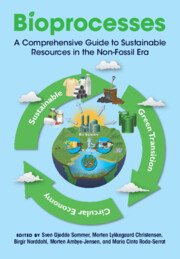Book contents
- Bioprocesses
- Bioprocesses
- Copyright page
- Contents
- Contributors
- Preface
- Acknowledgments
- Abbreviations
- 1 Introduction
- 2 Biomass
- 3 Sustainability, Circularity, LCA, and Governance
- 4 Conservation, Logistics, and Risk Analysis
- 5 Chemical Product Design
- 6 Chemical Processes and Modeling
- 7 Pretreatment of Biomass: Structural Modification, Preparation, and Fractionation of Biomass for Further Conversion
- 8 Separation Processes and Biomass Fractionation
- 9 Microbial Conversion
- 10 Thermochemical Conversion of Biomass
- 11 Basic Business Concepts and Cost Accounting and Analysis
- Glossary
- Index
- References
10 - Thermochemical Conversion of Biomass
Published online by Cambridge University Press: 24 January 2025
- Bioprocesses
- Bioprocesses
- Copyright page
- Contents
- Contributors
- Preface
- Acknowledgments
- Abbreviations
- 1 Introduction
- 2 Biomass
- 3 Sustainability, Circularity, LCA, and Governance
- 4 Conservation, Logistics, and Risk Analysis
- 5 Chemical Product Design
- 6 Chemical Processes and Modeling
- 7 Pretreatment of Biomass: Structural Modification, Preparation, and Fractionation of Biomass for Further Conversion
- 8 Separation Processes and Biomass Fractionation
- 9 Microbial Conversion
- 10 Thermochemical Conversion of Biomass
- 11 Basic Business Concepts and Cost Accounting and Analysis
- Glossary
- Index
- References
Summary
Our infrastructure and production is based on fossilized carbon feedstock. This fossil carbon used was once biogenic carbon that has undergone a natural thermochemical conversion and very similar products can be produced from biomass via thermochemical processing; enabling the utilization of the existing infrastructure. The thermochemical processes; pyrolysis, gasification, and combustion, are commercially available for coal but their adaption to biomass is lagging. Understanding both the chemical and physical differences and considering the process chemistry can, however, mitigate this. This chapter talks the reader though the carbon and process chemistry in the thermal and hydrothermal processing of biomass.
Information
- Type
- Chapter
- Information
- BioprocessesA Comprehensive Guide to Sustainable Resources in the Non-Fossil Era, pp. 359 - 385Publisher: Cambridge University PressPrint publication year: 2025
